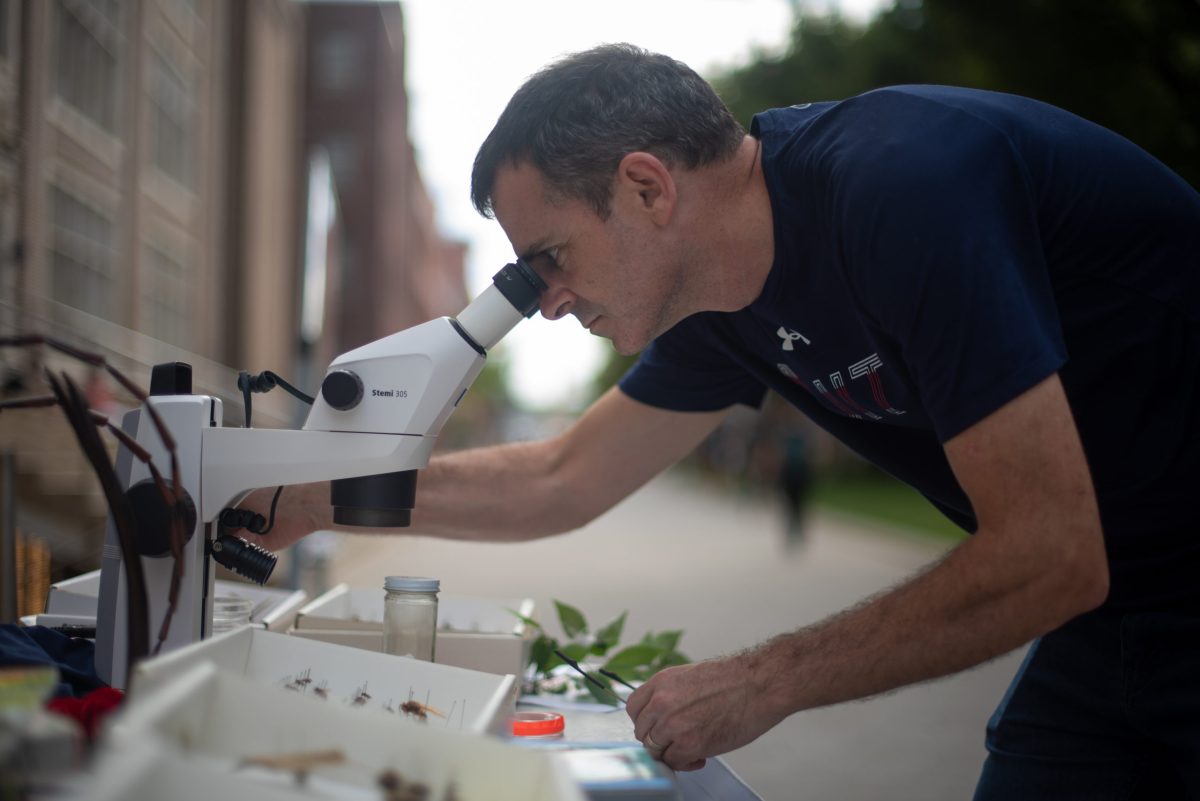Walking around the NJIT and Rutgers-Newark campuses, on the lookout for animals and plants of every kind and reporting them back to the organizers – that’s the “BioBlitz” event in a nutshell. During this year’s BioBlitz, 719 observations of 220 species were made by 132 observers and identified by 87 identifiers as of Saturday, Sept. 25.
According to the Urban Ecology Lab of the Department of Biological Sciences, which consists of Gareth Russell, Dan Bunker, Maria Stanko and Caroline DeVan, the first event called “BioBlitz” happened in 1996, in Kenilworth Park in Washington DC. “Since then, they have become popular citizen science events, occurring anywhere from relatively pristine national parks to urban locations like NJIT,” the lab states. On Sept. 23, a BioBlitz occurred on the NJIT campus, organized under the banner of the lab and coordinated with the Albert Dorman Honors College as part of their freshman environmental focus. “Our campus BioBlitz started as a Rutgers-focused event and then expanded to encompass both Newark campuses.” This year, Russel continued, is the first year that “we will have a coordination hub on the NJIT campus itself.” NJIT had always joined, but “there’s less participation if you don’t have a table on campus.” This year, the participation level was significantly higher. The week-long event covered all the NJIT and Rutgers-Newark campuses, although the Rutgers event had to be rescheduled to another day due to storm warnings.
During the last three BioBlitzes in Newark, over 200 different species were recorded each time. “On an urban campus like ours, the main animals people will find are invertebrates such as insects, as well as birds and squirrels. Other mammals such as mice are undoubtedly here as well, but hard to spot,”, the lab informed. “But biological diversity includes plants and fungi, and there are lots of those as well.” Once spotted, the data is recorded in the iNaturalist system, which is “an online social network of people sharing biodiversity information to help each other learn about nature” according to its website. For this year’s BioBlitz, the grey squirrel has been spotted the most (17 times), followed by the Spotted Lanternflies (13 times). “[The Lanternflies] seem particularly attracted to the glass front of the WEC,” said Russel. “They are an invasive species to sweep across our ecosystem.” As of Sept. 26, Russel recorded over 300 species at this year’s event, setting the all-time record across the combined campuses.
Stanko, who manned the coordination table with Russel, explained what they do after the data is collected: “We spend time verifying the findings. Is there anything unusual? Do we need to follow up on something? Were there misinterpretations?” The results, she continued, are used to better understand the native and non-native species on campus, as well as for recommendations for the future to ensure a better habitat. In addition to that, the lab states: “The main purpose of a BioBlitz is to bring awareness of the biological diversity that is all around us, even in an urban location like NJIT.” According to them, NJIT’s campus could be a lot more friendly to wildlife. The stuffed birds on the coordination table, for example, are all birds that died because they hit NJIT’s windows. “I’m hoping to make our campus more wildlife friendly,” Russel said.
A few steps have already been taken: the lab reports that the Honors College has been working to improve things with their annual planting design competition. “This has led to the pollinator gardens behind the ADHC itself, and soon will include the slope between Eberhardt Hall and Bleeker Street.” Another competition created by both the Honors College and the lab is to solicit designs for the Campus Center roof garden. “One of the UEL’s visions is to make our campus into a ‘Living Lab’ for ecological and environmental research. Anyone who wants to be part of this effort should get in touch!” the lab encouraged. “We now know that exposure to nature brings quantifiable improvement to people’s psychological well-being, especially in settings, like a city, where nature is normally scarce. Even small changes can bring big benefits. We feel that for NJIT, it’s a win-win!”































